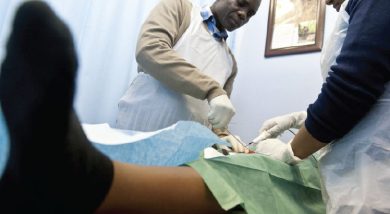Nutrition supplies are medicine
Esnat Chimatiro’s 18-month-old daughter, Hanifa, smiles while taking a peanut butter supplement used for treating severe wasting in children.
The baby, born in January 2022, has been taking the ready-to-use therapeutic food (RUTF) since she was six months old. She receives 14 packets every Friday at Kawinga Village Clinic near her home in Traditional Authority Chowe, Mangochi.
“This is medicine,” says Chimatiro, cuddling the baby. “My second-born receives two RUTF packets per day. She takes one in the morning and another in the evening.”
Hanifa does not eat more or less than prescribed by health surveillance assistant (HSA) Torea Simenti, who built the village clinic.
Unicef, with funding from the UK Foreign, Commonwealth and Development Office (FCDO) is supporting Malawi’s decentralised treatment of severe malnutrition in Mangochi, Dedza and Mzimba. This includes training health workers and providing essential supplies, including RUTF, therapeutic milk and nutrition screening tool kits.

The village clinic has cut long walks to Mase Health Centre, where patients pay for services outside its service-level agreement with the Ministry of Health. A return motorcycle trip to the Christian Health Association of Malawi (CHAM) facility costs about K3 000.
“The frequent trips would have made me poorer,” says Chimatiro
A year after being diagnosed with severe wasting, Hanifa, who weighed two kilogrammes at birth, looks healthier.
“I feared losing my daughter as she weighed just three kilogrammes nine months after birth. Thanks to the RUTF, she can afford a smile. She now plays with her sister. Before, she was weak and sickly,” says the relieved mother of two.
Hanifa’s recovery personifies the power of the two-sachets-per-day dose. Previously, some children were receiving over 80 packets a month, depending on body weight.
“The standard dose has made malnutrition treatment easy like any other dosage. I give Hanifa two sachets a day though she cries for more,” says Chimatiro.
She promptly consults the HSA when she detects a change in Hanifa’s health.
Simenti, who wanted to become a nurse, has found joy in delivering primary health care. Since 2017, the community health worker has been going village to village, delivering life-saving messages and supplies, including nutrition supplements, vaccines, modern family planning methods and water treatment chemicals.
“I built the village clinic in 2019 because women in my area were shunning health services, including malnutrition treatment, due to long walks to Mase. Now they see me any time, even at night,” she states.
Simenti says the standard dosage has reduced stock-outs and misuse of RUTF.
“Most children were defaulting when RUTF was being dispensed at the distant Cham facility and it wasn’t easy to trace them and assess their health as I do when giving RUTF every week,” she recalls.
The HSA opened the village clinic after being trained not to store or dispense medicines and vaccines in the open.
She approached village heads to construct a shelter for an under-five clinic then held in the open come rain or sunshine.
A lukewarm community response moved her up to make
5 000 bricks, sheaf grass, buy plastic sheeting, and recruit local bricklayers to build the clinic on a piece of land she inherited from her parents.
She narrates: “Before, many children were dying from treatable diseases like malnutrition because their parents couldn’t afford hospital trips. Some didn’t know that the Cham facility was dispensing RUFT free of charge while others were afraid of making off-pocket payments for treatment of opportunistic conditions,” Simenti narrates.
Now she sees no less than five children a day and refers critical cases to Mase health centre.
“The village clinic has dramatically improved follow-ups. When we give them RUTF, we also assess if the child is taking and assess any change.”
Fieldworker Rita Kaunda coordinates nutrition activities in communities surrounding Mase, Malukula, Malombe, St Martin’s, Malombe and Chikole health centres.
She says many parents have embraced the weekly distribution that has eliminated off-pocket payments and malnourished children now get constant feedback.
She explains: “In all six health facilities, we have observed little or no difference in how children receiving and responding to the standard distribution.
“Previously, some used to sell the packets because they felt it was too much. With the standard dose, they appreciate that RUTF is medicine to be taken as prescribed,” she says.
And deaths from malnutrition are falling with weekly replenishments and checkups, says Kaunda.
“The standard distribution and village clinics have simplified follow-ups.
She brags: “No child in my zone has died from malnutrition since November 2022.”






One Comment